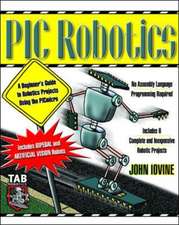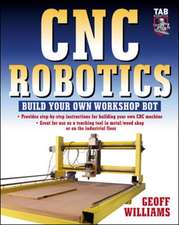Design and Use of Assistive Technology: Social, Technical, Ethical, and Economic Challenges
Editat de Meeko Mitsuko K. Oishi, Ian M. Mitchell, H. F. Machiel Van der Loosen Limba Engleză Paperback – 20 sep 2014
| Toate formatele și edițiile | Preț | Express |
|---|---|---|
| Paperback (1) | 1022.57 lei 6-8 săpt. | |
| Springer – 20 sep 2014 | 1022.57 lei 6-8 săpt. | |
| Hardback (1) | 1029.50 lei 6-8 săpt. | |
| Springer – 6 oct 2010 | 1029.50 lei 6-8 săpt. |
Preț: 1022.57 lei
Preț vechi: 1076.40 lei
-5% Nou
Puncte Express: 1534
Preț estimativ în valută:
195.72€ • 203.56$ • 164.01£
195.72€ • 203.56$ • 164.01£
Carte tipărită la comandă
Livrare economică 13-27 martie
Preluare comenzi: 021 569.72.76
Specificații
ISBN-13: 9781489989802
ISBN-10: 1489989803
Pagini: 140
Ilustrații: XX, 117 p.
Dimensiuni: 155 x 235 x 7 mm
Greutate: 0.2 kg
Ediția:2010
Editura: Springer
Colecția Springer
Locul publicării:New York, NY, United States
ISBN-10: 1489989803
Pagini: 140
Ilustrații: XX, 117 p.
Dimensiuni: 155 x 235 x 7 mm
Greutate: 0.2 kg
Ediția:2010
Editura: Springer
Colecția Springer
Locul publicării:New York, NY, United States
Public țintă
ResearchCuprins
The User’s Experience.- Better Than New! Ethics for Assistive Technologists.- The Myth of Neutral Technology.- Accessible Technology and Models of Disability.- The Importance of Play: AT for Children with Disabilities.- Need- and Task-Based Design and Evaluation.- Research and Academic Outreach.- Challenges to Effective Evaluation of Assistive Technology.- Community Service in University Curricula.- Providing Innovative Engineering Solutions Between Academia and Industry.- Case Study: An Assistive Technology Ethics Survey.- Development and Commercialization.- The Fast Pace of New Emerging Information and Communication Technologies: The Need for Regulations and Standards.- Small Markets in Assistive Technology: Obstacles and Opportunities.
Textul de pe ultima copertă
Design and Use of Assistive Technology provides an interdisciplinary approach to assess some of the major hurdles in creating effective assistive technology. Assistive technology must be integrated with clinical needs, user requirements, ethical considerations, and the social context of the technology’s use. Gaps between engineering design, clinical evaluation, and actual use often derail potentially transformative technologies that would otherwise enable independence and facilitate social connectedness. This volume gathers recommendations that span engineering, computer science, rehabilitation sciences, and ethics. This book: •Addresses difficult problems such as the inherent heterogeneity of users, privacy concerns in data collection and analysis, and incorporation of user perspective into the design and evaluation process•Discusses models for knowledge transfer of novel technologies, advantages and disadvantages of small markets, and regulations and standards to enable commercialization•Presents a framework for ethics of “accessible” technologies that differs from frameworks for engineering or medical ethicsDesign and Use of Assistive Technology demonstrates how multidisciplinary process improvements in assistive technology deployment have the potential to empower businesses, researchers, and nonprofit organizations to create and bring to market new devices that incorporate ethical, social, and clinical concerns to enhance people’s lives.
Caracteristici
Offers a multidisciplinary approach to assistive technologies and considers the entire cycle of design, evaluation, knowledge transfer, and use Presents theories on assistive technology from experts in a number of varied fields, ranging from engineering and computer science to occupational therapy and neurology Discusses assistive technologies in a broad scope that presents designs and theories that are universal Includes supplementary material: sn.pub/extras










